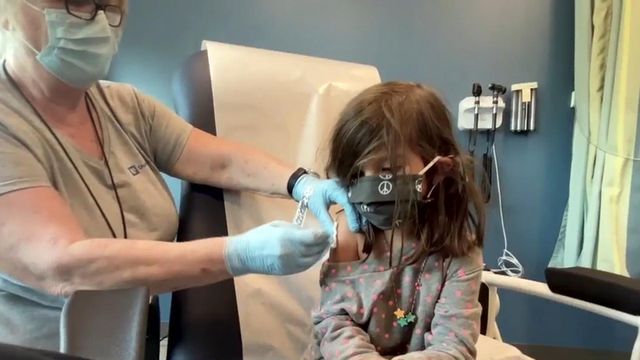Pfizer seeks FDA authorization of COVID-19 vaccine for children ages 5 to 11
Pfizer and BioNTech said Thursday they are seeking U.S. Food and Drug Administration emergency use authorization for their coronavirus vaccine for children ages 5 to 11.
Posted — UpdatedIf authorized, it would be the first coronavirus vaccine for younger children. The Pfizer/BioNTech vaccine is approved for people age 16 and older and has an emergency authorization for those ages 12 to 15.
Parents have been requesting the vaccine for their young children, Langdon said, and she doesn't want to see any more children end up in a hospital with COVID-19.
“We believe vaccines are safe. We believe vaccines are effective," she said.
Last month, Pfizer released details of a clinical trial that showed its vaccine was safe and generated a "robust" antibody response in children ages 5 to 11. The trial included 2,268 participants in that age group and used a two-dose regimen of the vaccine, administered 21 days apart. This trial used a 10-microgram dose – smaller than the 30-microgram dose that has been used for those 12 and older.
Participants' immune responses were measured by looking at neutralizing antibody levels in their blood and comparing those levels to a control group of 16- to 25-year-olds who were given a two-dose regimen with the larger 30-microgram dose. Pfizer said the levels compared well with older people who received the larger dose, demonstrating a "strong immune response in this cohort of children one month after the second dose."
Choucair said a recent study showed a third of parents are eager to get the vaccine for their children.
"There is another third who want to wait and see how that progresses,” he said.
Leah Nixon is part of the final third of parents who aren't interested at all in vaccinating their children against coronavirus.
“I am just not with it," Nixon said. "My kids are not in school, they are not in day care, so I would not get them vaccinated."
Some parents shared concerns on social media of possible side-effects from the vaccine on their children, such as an inflammation in the heart.
Dr. Emmanuel Walter, a pediatrician and director of the Duke Vaccines and Trials Unit involved in the Pfizer study, said that the virus poses a bigger danger to children.
"A higher percentage of the population that is getting infected is kids," Walter said.
Pfizer began submitting its data on the vaccine for younger children to the FDA late last month but had not formally requested authorization until now.
FDA officials had said that, once vaccine data for younger children was submitted, the agency could authorize a vaccine for younger children in a matter of weeks – not months – but it would depend on the timing and quality of the data provided.
In anticipation of the request, the FDA last week scheduled an Oct. 26 meeting of its Vaccines and Related Biological Products Advisory Committee to discuss the vaccine in children ages 5 to 11. If the FDA approves it, a panel of Centers for Disease Control and Prevention vaccine advisers will meet to consider whether to recommend its use.
"We know from our vast experience with other pediatric vaccines that children are not small adults, and we will conduct a comprehensive evaluation of clinical trial data submitted in support of the safety and effectiveness of the vaccine used in a younger pediatric population, which may need a different dosage or formulation from that used in an older pediatric population or adults," Acting FDA Commissioner Dr. Janet Woodcock said in a statement.
Even as Pfizer moves forward on vaccines for children, more trials are being done, including at Duke University, on children as young as 6 months old.
Related Topics
• Credits
Copyright 2024 by WRAL.com and CNN. All rights reserved. This material may not be published, broadcast, rewritten or redistributed.






